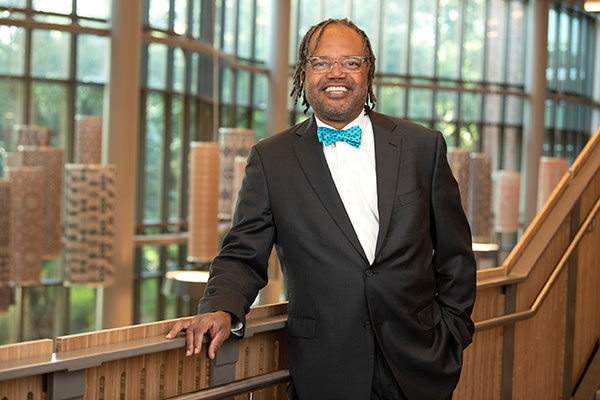
As the Freeman School’s first associate dean for Equity, Diversity and Inclusion, Erick Valentine is responsible for embedding the values of EDI throughout the business school.
African American students make up nearly 10% of Tulane University’s total enrollment but just 4% of enrollments at the Freeman School. That disparity troubles Erick Valentine.
“The business school has the largest undergraduate enrollment at Tulane, but one of the lowest enrollments of minorities,” says Valentine. “We’ve got to change that, not only for African American students, but for other minorities that represent another 25% of the student population.”
Increasing enrollment numbers of historically underrepresented groups is just one of the tasks Valentine is taking on in his role at the Freeman School’s first associate dean for Equity, Diversity and Inclusion (EDI).
Appointed by Dean Paulo Goes in 2022, Valentine, a professor of practice in accounting, is charged with leading the school’s effort to embed EDI throughout programs and operations. His responsibilities include supporting and advocating for underrepresented and underserved groups within the school, coordinating with Tulane’s Office of Equity, Diversity and Inclusion on university-wide EDI initiatives, and working with school and university administration to improve the recruitment and retention of a more diverse faculty, staff and student body.
“I want Freeman to be viewed as a place where everyone has opportunity, where everyone is supported, and where there is diversity in thought, diversity in gender and diversity in race,” he says. “I want to make Freeman a place that people gravitate to because of the culture.”
“Equity, Diversity and Inclusion has long been an area of focus, but it’s taken on greater urgency in recent years,” said Dean Goes. “As an organization, we need to incorporate the values of EDI into everything we do, and as a business school, we need to prepare leaders who understand the importance of EDI to organizational success. With his business experience and background, Erick is the perfect candidate to lead these efforts at the Freeman School, and I couldn’t be happier or more excited to have him serve in this new role.”
A graduate of Jackson State University, Valentine spent two years at 3M as a product accountant before returning to school to earn his Master of Accounting from the University of Illinois and his PhD from the University of Memphis. Before joining Freeman in 2018 as a professor of practice, Valentine served on the business faculties of Kansas State University and Grambling State University, where he also spent a year as interim dean.
“At most of the places I’ve been, I’ve been the only African American in the building, so I know the isolation of minorities in a corporate or academic setting,” he says. “When anyone is isolated for any reason, they aren’t necessarily their best or most productive.”
That loss in productivity shows up on balance sheets. Valentine cites a number of academic studies that suggest more diverse organizations tend to have higher revenues and more retained earnings than less diverse organizations. That’s a message he hopes will resonate with some business school stakeholders.
“Even now, I hear people use the word quotas — ‘You’re trying to fill quotas,’” Valentine says. “That is not what we’re doing at all. We are making a special effort to seek excellence everywhere, and it has to be intentional. We have to make the effort to find excellence everywhere or else we will only find it in one area.
“I can’t emphasize enough,” he adds, “there is no quality penalty for diversity. It only increases the quality pool.”
After teaching a full load of classes last year, Valentine is just beginning to settle into his new role and develop plans for the position. In July, he hired Rosalind Butler, formerly assistant director of the Tulane Family Business Center, to serve as director of Equity, Diversity and Inclusion. In that role, she assists Valentine in developing programs and initiatives with responsibilities including acting as EDI liaison with other Tulane schools and departments, developing relationships
with business and community partners, and serving as point of contact for students and student organizations. Together, they’re currently working with Tulane’s Office of Equity, Diversity and Inclusion to analyze the responses of Freeman School students, faculty and staff members to Tulane’s EDI Climate Survey.
“That’s what we’re doing now — benchmarking where we are as a school,” Valentine explains. “Going forward, we hope to see measurable improvement year by year — improvement in the quantifiable diversity of students, faculty and staff but also improvement in perception regarding EDI. That’s more qualitative so it’s a little harder to gauge, but I think that by identifying our goals and being intentional about achieving them, we can get there.”


